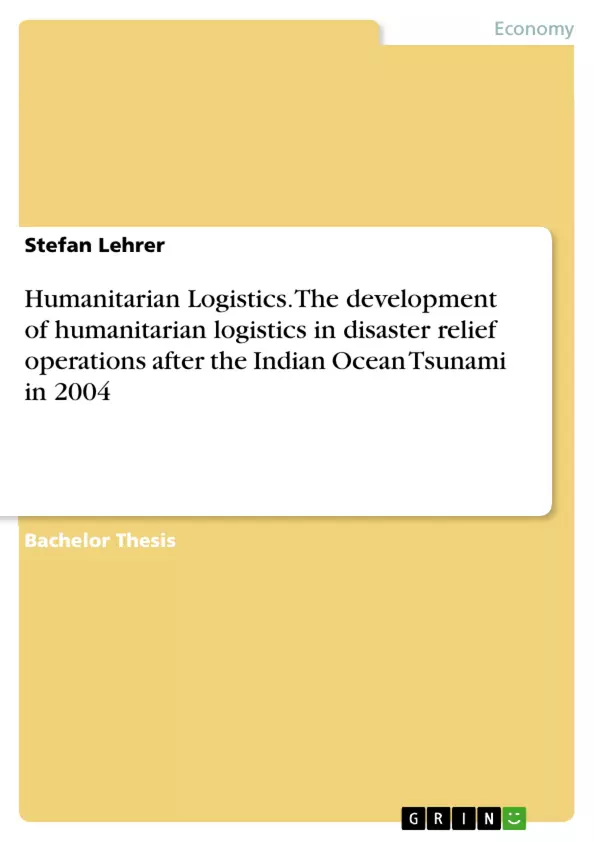Since the average number of disasters per year increased over the last few years, also the interest in humanitarian logistics amplified. The purpose of humanitarian logistics is to deliver relief supplies efficiently into affected regions in order to aid people in need.
The aim of this paper is to determine if a positive development in the field of humanitarian logistics took place since 2004. Moreover it shall be investigated if the development status of a country has an influence on the efficiency in disaster relief operations. Therefore, operations in the field of humanitarian logistics will be divided into three phases in the theoretical part of this paper, namely: preparation, immediate response and recovery. Each phase will be described in detail at the beginning of this bachelor thesis and subsequently, three different disaster relief operations, which were conducted in 2004, 2010 and 2011, will be compared by reference to these phases. The selection of the catastrophes was based on two criterions: firstly, the catastrophes had to be similar in their magnitude and secondly, at least one disaster relief operation had to be conducted in an industrialized country.
Based on the theoretical part of this paper, interviews with experts were conducted in order to gain insights into their way of thinking. The hypothesis “There is a connection between the efficiency in a disaster relief operation and the development status of the country in which the operation is conducted” should serve as basis for this research. Furthermore, at the end of this paper it should be determined if the development in the field of humanitarian logistics is considered as positive by the experts or if there is a standstill in this regard.
Inhaltsverzeichnis (Table of Contents)
- Introduction
- Theoretical Foundations
- Preparation
- Immediate Response
- Recovery
- Empirical Findings
- The Indian Ocean Tsunami in 2004
- The Earthquake in Haiti in 2010
- The Earthquake in Japan in 2011
- Expert Interviews
- Discussion
- Conclusion
Zielsetzung und Themenschwerpunkte (Objectives and Key Themes)
This paper explores the development of humanitarian logistics in disaster relief operations since the 2004 Indian Ocean Tsunami. It aims to determine whether this field has seen positive progress and if a country's development status affects the efficiency of disaster relief operations.
- The development of humanitarian logistics in disaster relief operations
- The impact of a country's development status on the efficiency of disaster relief operations
- The importance of coordination and cooperation among aid agencies
- The role of the three phases of disaster relief: preparation, immediate response, and recovery
- Case studies of the Indian Ocean Tsunami (2004), the Haiti Earthquake (2010), and the Japan Earthquake (2011)
Zusammenfassung der Kapitel (Chapter Summaries)
The paper begins with an introduction outlining the purpose and objectives of the research. It then delves into the theoretical foundations of humanitarian logistics, detailing the three distinct phases of disaster relief: preparation, immediate response, and recovery. Each phase is meticulously described, setting the stage for the analysis of three specific case studies.
The empirical findings section examines the disaster relief operations conducted in response to the Indian Ocean Tsunami in 2004, the earthquake in Haiti in 2010, and the earthquake in Japan in 2011. Each case study is analyzed in relation to the three phases of disaster relief, highlighting key challenges and successes. The analysis draws comparisons between the operations in different countries, exploring the influence of development status.
Expert interviews were conducted to gain insights into the perspectives of professionals in the field. Their views on the development of humanitarian logistics, coordination challenges, and the impact of development status on efficiency are incorporated into the discussion.
Schlüsselwörter (Keywords)
Key words related to this paper include: humanitarian logistics, disaster relief operations, coordination, cooperation among aid agencies, South-East Asia 2004, Haiti 2010, Japan 2011, development status, efficiency.
Frequently Asked Questions
What is the purpose of humanitarian logistics?
Its purpose is to deliver relief supplies efficiently into affected regions to aid people in need after a disaster.
Which three disaster phases are described in the paper?
The paper divides operations into preparation, immediate response, and recovery.
Which case studies are compared in the research?
The paper compares the 2004 Indian Ocean Tsunami, the 2010 Haiti Earthquake, and the 2011 Japan Earthquake.
Does a country's development status affect disaster relief efficiency?
The research investigates the hypothesis that there is a connection between a country's development level and the efficiency of the relief operation.
Was there progress in humanitarian logistics since 2004?
The work seeks to determine if there has been a positive development or a standstill in the field according to experts.
- Arbeit zitieren
- Stefan Lehrer (Autor:in), 2015, Humanitarian Logistics. The development of humanitarian logistics in disaster relief operations after the Indian Ocean Tsunami in 2004, München, GRIN Verlag, https://www.grin.com/document/355386



